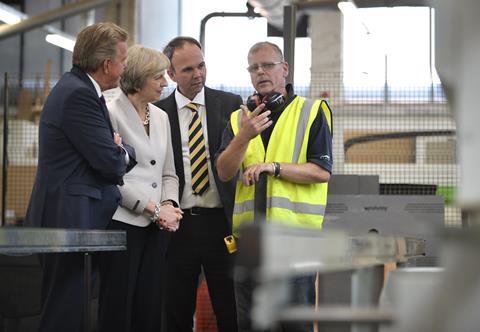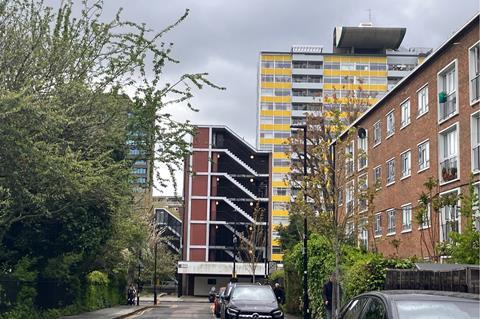
Toby Lloyd, an independent housing policy consultant and former special adviser to No 10 Downing Street, is the guest on this week’s Home Truths podcast series.
Before working for the government, Lloyd was head of policy and then housing development at Shelter, the campaigning housing and homelessness charity. His campaign work helped to move housing up the political agenda in the lead up to the 2015 general election.
Lloyd was a housing and regeneration policy special adviser to Theresa May for over a year until July 2019, when she was forced to resign having lost parliamentary support for her Brexit deal. During that time he worked directly for Gavin Barwell, who was May’s chief of staff from July 2017. Before that Barwell had served as housing and planning minister until he lost his parliamentary seat in the 2017 snap election.
More recently Lloyd has chaired the commission, set up by the Create Streets Foundation, co-authoring a report in 2021. He wrote another report for the Jospeh Rowntree Foundation in 2023 on how the government should respond to the UK’s emerging housing market downturn. He also served as one of our own commissioners last year during the �ڶ����� the Future Commission and fed into .
This interview, co-hosted by Jackie Sadek and Peter Bill, covers what Lloyd has learnt about effective campaigning before an election, his time close to the centre of power and why successive governments have so far failed to grapple with the complex structural problems that have led to the current housing crisis.
Lloyd argues that at the heart of the crisis is the dysfunctional way the land market works. He believes the next government should bring in compulsory purchase reform and other reforms in order to “capture land value for the public benefit”.
In the interview you will hear him mention how he fed into which looked at the gap between housing completions and land supply.
Sadek and Bill also quiz Lloyd on space standards, council house building and why he thinks the Labour party leadership has produced so little housing policy detail in this election year.
Here are some extracts from the interview, which is available to listen to via the player above or wherever you get your podcasts.
Also listen to:
>> Episode 1: In conversation with Peter Freeman at Homes England
>> Episode 2: In conversation with Jennie Daly at Taylor Wimpey
Q: Could we start by talking about your time at Shelter and the report you wrote while you were there?
A: So I wrote an awful lot of policy reports for Shelter on lots of different topics, from homelessness to private rented sector regulation, to housebuilding to welfare benefits. But I think what you’re referring to is the work I really focused on around housing supply.

Shelter is a campaign organisation, first and foremost, so it exists to change government policy. I stand by that as an approach because the housing sector is overwhelmingly determined by government in various ways, whether it’s through the benefits system, the planning system, tenure, law, mortgage regulation, homelessness legislation – there’s a huge number of different ways in which the government shapes the housing system as a whole.
I was working for them in a period of Conservative-led governments and during the years of austerity, so this was inherently a challenging time for the sector.
So we spent a lot of time trying to work out firstly what is the right policy prescription? But also, critically, the political message. How do we sell this to a Conservative government? And our experience was that, in the run up to the 2015 election, we had a lot of success in getting housing up the agenda [along with others].
The disastrous 2015 Housing Act … was in many way we thought exactly the opposite of what was required
Unfortunately, despite having achieved that, the [election] result was a Conservative government that came in and introduced what to Shelter’s eyes was a disastrous 2015 Housing Act, which was in many ways exactly the opposite of what was required. It was a big attack on council housing, they were going to forcibly sell off a large amount of council housing in order to fund a sort of complicated cross-subsidy mechanism.
[There was also] the forced selling off of housing association housing through extending the right to buy and various other policies, which we felt were deeply unhelpful.
So we went back to the drawing board. [Thinking] “how has it come to this? How, how have we managed to get housing up the agenda and influence the government and yet not actually influencing in the way we want it?”
So I’ve done a lot of work into recalibrating how we presented it to be more appealing to a Conservative audience. And some of that was cheap comms gimmicks [such as] changing the colour filters [on Shelter reports] from screaming red to Barbour jacket green.
And the photos… we used a lot of photos of Prince Charles’s Duchy of Cornwall developments at Poundbury and other places to try and get across the point that actually we’re not here to talk about tower blocks or brutalist architecture. What we care about is getting a system that enables more people to be housed better. And that means reforming the entire system.
Q: How then did it come about that you were brought into the heart of government and went into Number 10 as the housing adviser to Mrs May? And then, when you formed that axis with Gavin Barwell [Theresa May’s chief of staff from 2017], can you talk to us a little bit about that?
Well, as a result of doing this work to try and kind of reposition the branding of Shelter’s policy output, we were able to get an interview with the new team in the Number 10 operation. This was following the 2017 general election when Theresa May had been forced to clear out her entire advisor team and bring in Gavin Barwell, and James Marshall was head of policy.
So we went in and gave this pitch to James Marshall. And the next day, he phoned me up and asked me to come and join the government. So it showed that there was clearly a willingness on government to listen, which is not always the case.
The real problem was a fundamental misunderstanding of the way the land market works
So the first rule of influencing success is to get lucky. And we clearly got lucky. But I think it was also partly because we had made a conscious effort to make the message more appealing to that audience. But critically, we never changed the fundamental analysis. The problem with the housing system was not just a lack of subsidy or sclerotic planning, although both of those could be blamed.
The real problem was a fundamental misunderstanding of the way the land market works, and a kind of surrendering to economic rent extraction that drove dysfunction on every single level. And until we were prepared to grapple with that we would never really get to the bottom of the housing crisis. And there seemed briefly at least to be a willingness to entertain that idea.

Q: You’ve talked previously about repealing the 1961 Land Compensation Act. Can you unpack that a bit for us?
A: This is one of those incredibly kind of technical rather hidden factors that we eventually alighted on as being absolutely central to the problem of the land market. It is an absolute iron law of economics – and was recognised as such since the days of Adam Smith – that economic value will collect in land value. That is not helpful for the economy as a whole because it encourages people to speculate on an unproductive asset.
It encourages people to actually reduce their entrepreneurialism and just use whatever access to capital they have, whether it’s their own or borrowed, to simply bid up the price of existing property. And, as Adam Smith put it, it has a kind of moral problem because it encourages people to not bother working because you can make more from speculating on property.
Q: It is the case isn’t it that people have earned more on their house value than they do in their salaries? That’s quite an extraordinary fact
A: That is the case, except I wouldn’t use the word “earn”. Because of course, if your house has gone up in value, that’s very rarely because you’ve earned it. It is just because of society as a whole, whether it’s through the provision of infrastructure, overall economic growth, changing cultural attitudes, or whatever.
Society as a whole has generated value that is simply collated into the form of property values. And that’s what the economists call economic rent, which liberals like Adam Smith were very keen to drive out.
Some people make more money from watching their houses go up in value than from going to work, while other people see an ever larger proportion of their income spent on paying the rent
In housing terms, what it means is that some people make more money from just watching their houses go up in value than they do from going to work, while other people see an ever larger proportion of their income being spent on just paying the rent or the mortgage to somebody else.
I’m personally a big advocate of having a tax system that does a bit more work of keeping property values down and capturing land value for the public benefit. But it’s not enough. You will always need other interventions to control the supply of land coming into the system in order to prevent this kind of speculative ratchet effect.

[That is] why we need compulsory purchase reform. It feels like a marginal case but it’s not because ultimately the price of land is determined by whoever is the highest bidder. When you have a fixed supply of land, that then pushes up the price to the point where no one can afford to do anything good with that land. And that’s what we see now.
We see developers who find that to buy land they have to outbid each other. And how do they outbid each other? By cutting all the costs that they’re going to spend, by cutting every possible corner in terms of the quality of the space standards, the affordable housing, the infrastructure.
And the result is that before anyone has even applied for planning permission, let alone actually started laying bricks, you’ve already determined that the quality of the homes, the quality of the overall place you’re building will be as low as possible, and the land price will be as high as possible.
Q: On space standards, do you think that the ones that we have now should be improved?
A: Yes, I do. We have an odd thing in this country where we assume that flats will be smaller, pokier and nastier than houses when actually it should be the other way around. If you live in a flatted development, you’re in a more urban environment, you generally don’t have your own front door or garden. So it’s all the more important that your living space has really decent spatial standards inside.
I would say that increasing space standard is a necessary part of increasing urban densities
And certainly that’s true in a lot of countries. Whereas, in this country, our flats are smaller and worse quality. And then we wonder why people dislike flats and the aspiration and the culture becomes very much about your own house with a front door, which drives a kind of suburban, low density, car-dependent model of development that ultimately doesn’t work for us.

Q: It’s been suggested that, if you put space standards up by 20%, it wouldn’t do that much damage to the land values. Do you think 20% would be too much?
A: You could argue about the number. I’d be happy to see them higher still. How many people can really say that their house is just vastly too big? And their kids just have way too much room?
The balance there is not about land values, that’s not the constraining factor. I would like space standards and other quality factors to be pushing down land values. The constraining factor is just that, if the space in homes gets so large, it could lower overall urban densities to the point where public services become strained.
We’re a very, very long way off that because there’s so much wasted public space, mainly for roads and car usage. We could quite easily improve the internal space dramatically, while increasing urban densities. In fact, I would say that increasing space standards is a necessary part of increasing urban densities.
Q: You were getting quite close to getting some quite good things done at Number 10. What actually happened to puncture it?
A: I don’t think it’s giving away any massive political secrets to say that was a fairly chaotic period in government, at the height of the Brexit crisis. The government of the day had very little bandwidth, had very little ability to make any kind of long-term plans.
The problems we’re talking about in housing here are deep and structural. Ideally, you’d want 20 years to reform the tax system, the benefits system, the planning system, infrastructure supply. This was a government that was never quite sure if it was going to last another month.
So there wasn’t any point in starting that sort of thing. Even if I’d had everyone in government in agreement with me – and I very much didn’t.
I had a few minutes every couple of months with the prime minister, and every couple of weeks maybe with Gavin Barwell. There was no way you were going to launch that sort of structural reform. It was a matter of just finding little things you could do in a hurry.
The government of the day had very little bandwidth had very little ability to make any kind of long-term plan… I had a few minutes every couple of months with the prime minister
Q: Would you welcome the chance to go back in again into central government to give it another go?
A: Absolutely. I mean, it was an extraordinary experience. Even being a bit of an oddball in a fairly chaotic government in very challenging times, which had very little political capital, very little time and very little kind of bandwidth. Even in those inauspicious circumstances, I achieved more to improve the housing system in 14 months there than I did in seven years campaigning for Shelter.
Because there’s just no substitute for being closer to the levers. If you want to make the system better, it’s the only place you can do it.
Q: I just wanted to get your views on some things that Labour have said, such as they are going to bulldoze the planning system, they are going to build 1.5 million homes in five years, and they seem keen on new towns. What’s lacking is any detail, and those targets seem impossible to achieve. What are your views on their stated plans?
A: I do talk to Labour a lot. Firstly, this is an election year, there is a big difference between what you say to win an election, and when you’re in a programme for government. They’re just different things.

We have a political culture in this country and a media-led culture, which is deeply unhelpful in this regard. Everyone is just looking for a headline, no one bothers to even read the article beneath it, let alone the kind of analysis that goes behind that.
And then they [the media] just want to trip you up as a politician. So we shouldn’t be surprised that we have politicians who just stick to glib lines without any deeper commitment, because actually, that’s what we demand of them.
We shouldn’t be surprised that we have politicians who stick to glib lines without any deeper commitment because actually that’s what we demand of them
Beneath that though I think there is a lot more thinking. If you actually read the text of what came out during the Labour Party conference from Angela Rayner, from Matthew Pennycook and Keir Starmer himself, it did add up to an agenda.
So I actually think, you know, it may not be a fully detailed programme yet, but you wouldn’t expect that before an election. But the headlines are, broadly, what you would want to see: a commitment to building more homes, making more of them genuinely affordable and a recognition that planning has to do more of the heavy lifting.
Q: We always end our interviews by asking people the magic wand question, which is, if I gave you a magic wand and said you could do one thing, what would it be?
A: Well, normally when people ask me this question, I refer to the Land Compensation Act and improving the compulsory purchase system, but we’ve already done that, so I’m not going to say that. I’m going to say something really controversial that will really annoy you: we should be banning cars from new developments.

The next episode of Home Truths will be available to download on Tuesday 28 May.
Home Truths is a �ڶ����� Talks series in association with �ڶ����� and Housing Today. Episodes will be released every Tuesday on our websites and will be available via the main podcast providers such as and .
>> Click on the player at the top of this story to hear today’s episode


































1 Readers' comment